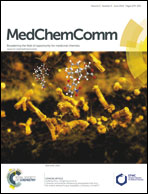The antimalarial drug atovaquone binds to saposin B with comparable affinity to coenzyme Q10
Abstract
Atovaquone is a front-line antimalarial drug that functions by competitively inhibiting binding of coenzyme Q10 to the cytochrome bc1 complex. Atovaquone is administered orally, but has low solubility and is poorly absorbed with high variability in bioavailability. In vivo binding of human serum albumin has been cited as the major transporter of atovaquone in plasma. The research presented herein demonstrates that saposin B, a known binder/transporter of coenzyme Q10, also binds to atovaquone in a 1 : 1 ratio and with comparably high affinity at pH 5.5.


 Please wait while we load your content...
Please wait while we load your content...